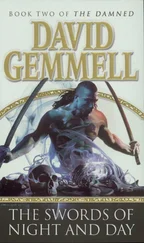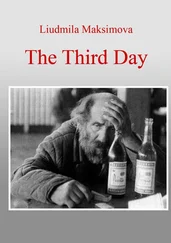David Epperson - The Third Day
Здесь есть возможность читать онлайн «David Epperson - The Third Day» весь текст электронной книги совершенно бесплатно (целиком полную версию без сокращений). В некоторых случаях можно слушать аудио, скачать через торрент в формате fb2 и присутствует краткое содержание. Жанр: Фантастика и фэнтези, на английском языке. Описание произведения, (предисловие) а так же отзывы посетителей доступны на портале библиотеки ЛибКат.
- Название:The Third Day
- Автор:
- Жанр:
- Год:неизвестен
- ISBN:нет данных
- Рейтинг книги:3 / 5. Голосов: 1
-
Избранное:Добавить в избранное
- Отзывы:
-
Ваша оценка:
- 60
- 1
- 2
- 3
- 4
- 5
The Third Day: краткое содержание, описание и аннотация
Предлагаем к чтению аннотацию, описание, краткое содержание или предисловие (зависит от того, что написал сам автор книги «The Third Day»). Если вы не нашли необходимую информацию о книге — напишите в комментариях, мы постараемся отыскать её.
The Third Day — читать онлайн бесплатно полную книгу (весь текст) целиком
Ниже представлен текст книги, разбитый по страницам. Система сохранения места последней прочитанной страницы, позволяет с удобством читать онлайн бесплатно книгу «The Third Day», без необходимости каждый раз заново искать на чём Вы остановились. Поставьте закладку, и сможете в любой момент перейти на страницу, на которой закончили чтение.
Интервал:
Закладка:
We had arrived at just the right time of day. The tan meleke glowed almost white in the early afternoon sun, a spectacle enhanced by the rays sparkling from the gold trim along the top.
“Wow,” said Bergfeld. “It’s magnificent.”
The others responded in the same way.
Markowitz, though, said nothing. He just stood there, mumbling something I didn’t understand, over and over.
Decius called out again, and I had to gently prod Ray forward, and even then, his eyes never strayed from the building. Roman engineers had paved this part of the road, too, so I had the additional task of keeping him from tripping over the curb.
“Just think,” said Bryson, “you’re the first Jew to see this in two thousand years.”
Markowitz didn’t reply. He just continued to stare at the Temple and kept on with his mumbling. Finally, he took a couple of steps over to Lavon and tapped him on the shoulder.
“Robert, where is the Western Wall? Can you show me what part of the Temple survived?”
The Jerusalem of Christ’s time consisted of two elevated areas separated by valley running along a north-south line through the center of town. Herod’s palace, including the three tall towers, dominated the western portion, which was known as the Upper City and served as the home of Jerusalem’s wealthy elite.
A long stone bridge, barely visible from where we walked, spanned the valley from the Upper City to the Temple Mount. Lavon pointed to it.
“In modern times, we call what’s left of that bridge Wilson’s Arch,” he said. “Now, look off to its right, to the southwestern corner of the Temple compound.”
Markowitz turned his eyes towards the top of the section Lavon had pointed out. “I can see it,” he said.
Lavon shook his head. “No, the upper part was torn down. The only thing that survived was the retaining wall underneath. That’s the Wailing Wall. The Romans destroyed everything else.”
Markowitz didn’t reply. He stared at the soldiers for a few minutes as he considered this, occasionally glancing back to the Temple.
“These Romans.” he finally said.
“ These Romans are keeping us alive,” I reminded him.
“That’s right,” said Lavon. “Besides, by the time the revolt started, most of these guys were already dead, and those who weren’t were hobbling around with canes and looking for their teeth — or whatever old people did back then.”
We all laughed, and Markowitz smiled. I could see it was forced, but he didn’t want to raise a stink. None of us did, really.
That included the Romans.
I looked ahead and saw Publius whisper quietly to the standard bearer at his side. The soldier, sporting a wolf’s head over his helmet, walked back double-time to the wagon with the signum — the unit’s standard that displayed its numerous commendations for distinguished service. He took the standard off its pole and carefully, almost reverently, wrapped it in a thick red velvet blanket.
Afterward, the signifer removed his wolf skin and wrapped it with equal care in another red blanket. Then he squeezed himself into the wagon and squatted next to his parcels. One of his wounded colleagues moved over to give him room.
“What’s he doing?” asked Markowitz.
“Something smart,” said Lavon. “Publius knows it’s provocative, so he sent his standard bearer back to cover it up. As you know, the Second of the Ten Commandments forbids “graven images,” which the more traditional-minded segments of the population interpreted as any representation of a man or an animal.”
The two sides’ mutual incomprehension on this subject proved to be a fertile source of conflict from the beginning of the Roman occupation until the crushing of the final revolt. The possibility of miscalculation was enormous, even in the best of times.
Just to be sure of his interpretation, Lavon questioned Decius, and the Roman confirmed what he had suspected.
He didn’t seem to like it very much.
Chapter 21
When we reached a point about a quarter mile from the gate, a soldier on the tallest battlement blew a trumpet, and our trumpeter blew his acknowledgment in return.
Lavon, though, paid this activity little attention. His eyes remained riveted on the gate itself — a straightforward, practical structure conveying a sense of solidity and strength.
Massive stone blocks overlaid an arch resembling an upside down U. Two battlements, twice the height of the surrounding wall, flanked the gate itself. Both were well equipped with slits for archers and gaps through which defenders could rain heavy stones or boiling oil down upon their attackers from any direction.
“You seem surprised,” I said.
“It’s not quite what I expected,” he replied. “The Damascus gate still exists — in our world. I took a tour group through it only a month ago.”
“It looks like this?”
“Not at all. It’s smaller, and the stonework is much more elaborate.”
He paused for a moment and looked around.
“Of course, this one does serve a real defensive purpose. The Ottomans built the modern gate in 1542, long after gunpowder weapons had rendered stone fortifications obsolete. They could afford to be decorative.”
That made sense.
“You have one problem, though,” I said. “When we get back, how are you going to convince anyone that your version is correct as opposed to all of those artist’s conceptions floating around?”
It was a question he couldn’t answer, and we both knew it.
“I haven’t quite worked that out yet.”
We never made any more progress resolving that issue, for at that moment, Sharon let out a horrified gasp.
Each of us turned in her direction, where we were confronted by the most gruesome spectacle I have ever had the misfortune to witness.
The nightmares still occasionally return.
Just off the side of the road, at the junction between the road we were on and the path running along the city wall to the southwest, stood what had once been the trunks of a dozen olive trees.
Horizontal beams were lashed to two of them, and hanging from those beams, suspended by nails, were objects that first appeared only as dark, reddened gelatinous masses. Shreds of flesh dangled downward from each, and both were covered almost entirely by hideous swarms of black flies.
Psychologists tell us that our minds have their own internal tricks to avert recognition of true horror, and it took us a few seconds to internalize that these ghastly objects were in fact men, still alive, with their faces contorted in agony and desperation.
Markowitz took one glance and immediately ran to the other side of the road, where he knelt and heaved his insides out. Bergfeld held her head down with her hands over her eyes, while Bryson stood motionless, transfixed by the dreadfulness of it all.
The next few minutes passed in a blur. I struggled to focus my attention forward and put the spectacle out of my head, but after we had gone about fifty more yards, Decius glanced back and saw that Markowitz and Bryson had not moved. Markowitz, in fact, remained on his knees, with his head down and his eyes staring blankly into the pool of vomit.
Decius said something to Lavon, but the archaeologist had turned pale as well and didn’t respond. Since I could gather the gist of what the optio was trying to say, I went trotting back to retrieve the others.
I saw no guard around the victims, so I reached into my first aid kit and ripped open two white packets. I removed the small cylinders, pulled off the lids, and jabbed one into the foot of each man.
I got lucky. Both had visible veins.
I turned and pushed Bryson in the back toward the general direction of the city; then I lifted Markowitz up by his robe.
Читать дальшеИнтервал:
Закладка:
Похожие книги на «The Third Day»
Представляем Вашему вниманию похожие книги на «The Third Day» списком для выбора. Мы отобрали схожую по названию и смыслу литературу в надежде предоставить читателям больше вариантов отыскать новые, интересные, ещё непрочитанные произведения.
Обсуждение, отзывы о книге «The Third Day» и просто собственные мнения читателей. Оставьте ваши комментарии, напишите, что Вы думаете о произведении, его смысле или главных героях. Укажите что конкретно понравилось, а что нет, и почему Вы так считаете.












